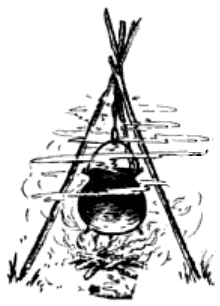18th century settlers obtained salt from salt springs, also known as salt licks, by collecting the water from the springs in large kettles & boiling it down over open camp fires. The resulting salt was then packed into sacks and bags and transported back to the settlement on horses.
Salt Boilers & Salt Licks.
Late in the year 1777 the Virginia government sent out several large
salt-boiling kettles for the use of the Western settlers. Both residents and
visiting militiamen were allotted into companies, which were to relieve each
other at salt-making until sufficient was manufactured to last the several
stations for
a year. It was Boone's duty to head the first party, thirty strong,
which, with the kettles packed on horses, went to Lower Blue Licks early in
January.
A month passed, during which a considerable quantity of salt was made;
several horse-loads had been sent to Boonesborough, but most of it was still at
the camp awaiting shipment. The men were daily expecting relief by
the second company, when visitors of a different character appeared.
While half of the men worked at the boiling, the others engaged in the double
service of watching for Indians and obtaining food ; of these was Boone. Toward
evening of the seventh of February he was returning home from a wide circuit with his packhorse laden with buffalo-meat and some
beaver-skins, for he had many traps in the neighborhood. A blinding snow-storm
was in progress, which caused him to neglect his usual precautions, when
suddenly he was confronted by four burly Shawnese, who sprang from an ambush.
Keen of foot, he thought to outrun them, but soon had to surrender, for they shot
so accurately that it was evident that they could kill him if they would.

No comments:
Post a Comment